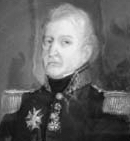General Jean Ernest Beurmann

Born: October 25, 1775
Place of Birth: Strasbourg, Bas-Rhin, France
Died: October 10, 1850
Place of Death: Toulon, France
Arc de Triomphe: BEURMANN, J=F. on the west pillar
Pronunciation:
Coming from a military family, Jean Ernest Beurmann was adopted as a child of the infantry regiment of Salm-Salm alongside his brother Frédéric Auguste Beurmann in 1784. In 1788 he enlisted in the army and in 1790 he was commissioned as a sous-lieutenant. The next year Beurmann was promoted to lieutenant in the 19th Infantry and then in May of 1792 he was promoted to capitaine. He served under Dumouriez's command and therefore he fought at the Battle of Valmy in September. Beurmann went on to serve at the Siege of Antwerp and the Siege of Maestricht. In March of 1793 he fought at Neerwinden and then in September he fought at Hondschoote . In 1794 Beurmann joined the staff of the army and he served at the Battle of Fleurus before being assigned to the Army of the Sambre and Meuse. The next month he fought at the combat of Montagne de Fer where he was wounded by a shot to the right foot. In 1795 Beurmann took part in the crossing of the Rhine at Dusseldorf where he was wounded and then he took part in the Siege of Mainz. The next year he served at the Battle of Wurzburg and then in 1797 he joined the 20th Light. Beurmann served in the Army of Switzerland in 1798 and the Army of Italy in 1799. In July of 1799 he was taken prisoner at the affair of San Giuliano. In May of 1800 he was promoted to chef de bataillon despite still being held prisoner, but he was released in June and he rejoined his regiment in the Army of Italy.
Beurmann returned to France and for a time he served with troops stationed at Toulon. In 1805 he was sent to the camp of Saint-Omer and later in the year when the army marched out to face the Third Coalition he went with them. Taking part in the campaign, Beurmann fought at Augsbourg in October under René and then in November his unit was assigned to Marshal Soult's IV Corps. He fought at the Battle of Austerlitz in December of 1805 and then in October of 1806 he became chief of staff of a light cavalry brigade of IV Corps. That same month Beurmann served at the Battle of Jena and then in November he served at the action of Lübeck. In 1807 he served as chief of staff of the 2nd Division at the Battle of Eylau and then in June he served at Heilsberg and Koenigsberg. In 1808 Beurmann was named a Baron of the Empire.
In February of 1809 Beurmann was sent to Spain to serve in the Army of Catalonia. Later that year he became chief of staff of a Westphalian division and he distinguished himself at the Siege of Girona when he took the convent of Saint-Denis and mounted the assault on the fort of Mont-Saint-Jean. In 1810 Beurmann was named chief of staff of the division of upper Catalonia and in 1811 he served at the combat of Figuières and then the Siege of Figuières. He was promoted to général de brigade in October of 1811 and the next month he was appointed deputy chief of staff of the Army of Catalonia. At the end of the year Beurmann took command of a brigade in Quesnel's division and in April of 1812 he won at San Felice de Cudinas and Olot. Beurmann served at Casa Massana in November and then in 1813 he served on the route to Barcelona. In March of 1814 he was recalled to France to bring reinforcements and he joined Marshal Augereau and served at Limonest.
After Napoleon's abdication and the return of the Bourbons, Beurmann was put on non-activity but named a Knight of Military Merit. When Napoleon returned to power in 1815 for the Hundred Days, Beurmann was employed in Albert's division in the Army of the Rhine. That June he fought at Lampertheim and after the Bourbons regained power again he was put on non-activity.
Bibliography
- Divry, Arnauld. Les Noms Gravés sur l'Arc de Triomphe. Paris: L'Harmattan, 2017.
- Six, Georges. Dictionnaire Biographique des Généraux & Amiraux Français de la Révolution et de l'Empire (1792-1814). 2 vols. Paris: Gaston Saffroy, 2003.
Related Pages:
Updated October 2019
© Nathan D. Jensen